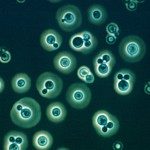Link to Pubmed [PMID] – 29109169
Antimicrob. Agents Chemother. 2018 Jan;62(1)
and are environmental fungi that cause cryptococcosis, which is usually treated with amphotericin B and fluconazole. However, therapeutic failure is increasing because of the emergence of resistant strains. Because these species are constantly isolated from vegetal materials and the usage of agrochemicals is growing, we postulate that pesticides could be responsible for the altered susceptibility of these fungi to clinical drugs. Therefore, we evaluated the influence of the pesticide tebuconazole on the susceptibility to clinical drugs, morphophysiology, and virulence of and strains. The results showed that tebuconazole exposure caused cross-resistance (CR) between the agrochemical and clinical azoles (fluconazole, itraconazole, and ravuconazole) but not with amphotericin B. In some strains, CR was observed even after the exposure ceased. Further, tebuconazole exposure changed the morphology, including formation of pseudohyphae in H99, and the surface charge of the cells. Although the virulence of both species previously exposed to tebuconazole was decreased in mice, the tebuconazole-exposed colonies recovered from the lungs were more resistant to azole drugs than the nonexposed cells. This CR was confirmed when fluconazole was not able to reduce the fungal burden in the lungs of mice. The tolerance to azoles could be due to increased expression of the gene in both species and of efflux pump genes ( and ) in Our study data support the idea that agrochemical usage can significantly affect human pathogens present in the environment by affecting their resistance to clinical drugs.
